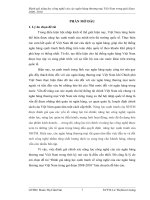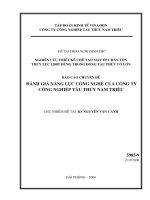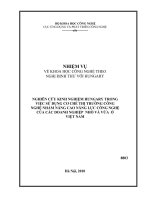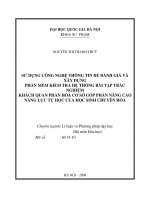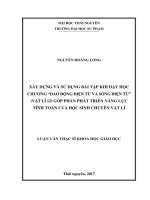TECHNOLOGY COMPETENCIES OF PRE SERVICE ENGLISH TEACHERS = NĂNG lực CÔNG NGHỆ của GIÁO SINH CHUYÊN NGÀNH sư PHẠM TIẾNG ANH
Bạn đang xem bản rút gọn của tài liệu. Xem và tải ngay bản đầy đủ của tài liệu tại đây (1.26 MB, 76 trang )
VIETNAM NATIONAL UNIVERSITY, HANOI
UNIVERSITY OF LANGUAGES AND INTERNATIONAL STUDIES
FACULTY OF ENGLISH LANGUAGE TEACHER EDUCATION
GRADUATION PAPER
TECHNOLOGY COMPETENCIES
OF PRE-SERVICE ENGLISH TEACHERS
Supervisor: Nguyễn Tuấn Anh
Student: Nguyễn Hoàng Thu Trang
Course: QH2017.F1.E7
HANOI – 2021
ĐẠI HỌC QUỐC GIA HÀ NỘI
TRƯỜNG ĐẠI HỌC NGOẠI NGỮ
KHOA SƯ PHẠM TIẾNG ANH
LUẬN VĂN TỐT NGHIỆP
NĂNG LỰC CÔNG NGHỆ
CỦA GIÁO SINH CHUYÊN NGÀNH SƯ PHẠM TIẾNG ANH
Giảng viên hướng dẫn: Nguyễn Tuấn Anh
Sinh viên: Nguyễn Hồng Thu Trang
Khóa: QH2017.F1.E7
HÀ NỘI – 2021
ACCEPTANCE PAGE
I hereby state that I: Nguyễn Hoàng Thu Trang, class QH2017.F1.E7, being a
candidate for the degree of Bachelor of Arts (program), accept the requirements of the
College relating to the retention and use of Bachelor’s Graduation Paper deposited in
the library.
In terms of these conditions, I agree that the origin of my paper deposited in the
library should be accessible for the purposes of study and research, in accordance with
the normal conditions established by the librarian for the care, loan or reproduction of
the paper.
Signature
Nguyễn Hoàng Thu Trang
Hanoi, June 6th, 2021
TECHNOLOGY COMPETENCIES
OF PRE-SERVICE ENGLISH TEACHERS
Submitted by Nguyễn Hoàng Thu Trang
Course: QH2017.F1.E7
Signature of Approval:
Supervisor’s Comments:
______________________________________________________________________
______________________________________________________________________
______________________________________________________________________
______________________________________________________________________
______________________________________________________________________
______________________________________________________________________
ACKNOWLEDGEMENTS
It is impossible to adequately express my gratitude to everyone who has helped me
throughout this long and challenging journey. This is only a partial attempt. My
supervisor, Mr. Nguyen Tuan Anh, has provided me with wisdom, encouragement, and
guidance. Thank you for your patience and consideration!
To my dear friends from the “Drama” group - Linh Mỹ, Linh xinh, Pink cloud,
lilyhaiyan, I express my gratitude for your encouragement and sympathy. I would like
to express my special thanks to Hằng, Linh salt, Mama Linh, Hương, Mai, Nhung, Ms.
Vi, Thảo and all participants for your support during the questionnaire and pilot process.
I am truly thankful for many family members and friends in my hometown who
provide support along the way to enable this accomplishment. My dear mother is my
most avid supporter. She continually encouraged my decision and advised me to stop
being so dead serious and too laid back throughout the lengthy process.
Most of all, thank you, Mi, for your strange determination on the impermanence of
things.
i
ABSTRACT
The present study aims to discover the level of technology competency of preservice English as a Foreign Language (EFL) teachers and their perceptions regarding
the effectiveness of the English teacher training program in equipping technology
competencies. The target group is a cohort of 124 final-year pre-service teachers at a
prestigious university in Vietnam.
To conduct the study, the questionnaire was carried out based on the Teacher
Digital Competence (TDC) framework and Technological Pedagogical Content
Knowledge (TPACK) survey. The course description of information and communication
technologies (ICT) in education subject was also analyzed to answer the research
questions. The results indicate that the technology competency perceived by pre-service
EFL teachers is at a high level. The areas in which teachers excel are TPACK
competencies, followed by personal-professional and personal-ethical competencies.
Likewise, the student teachers perceive the training of digital competencies in the teacher
education program as effective. However, it is proposed to integrate personal-ethical
competencies and provide further training on educational programs/applications and
productive collaboration in professional networks in the EFL teacher education program.
ii
TABLE OF CONTENT
ACKNOWLEDGEMENTS .................................................................................................. i
ABSTRACT ........................................................................................................................ ii
TABLE OF CONTENT...................................................................................................... iii
ABBREVIATION ................................................................................................................ v
LIST OF TABLES AND FIGURES ....................................................................................vi
CHAPTER 1: INTRODUCTION ......................................................................................... 1
1.1.
Rationale for the study ........................................................................................... 1
1.2.
Research aims and research questions..................................................................... 2
1.3.
Scope of the study .................................................................................................. 3
1.4.
Expected contributions of the research ................................................................... 3
1.5.
Outline of the paper ................................................................................................ 3
CHAPTER 2: LITERATURE REVIEW............................................................................... 4
2.1.
Technology competencies in teacher education ...................................................... 4
2.1.1.
Technology competency.................................................................................. 4
2.1.2.
The role of technology in teacher education program ...................................... 5
2.2.
Technology competency frameworks for educators ................................................ 6
2.2.1.
Technology competency frameworks for educators ......................................... 6
2.2.2.
The technology framework for EFL Teacher: Teacher Digital Competency
(TDC) framework........................................................................................................ 11
Chapter summary ............................................................................................................ 14
CHAPTER 3: METHODOLOGY ...................................................................................... 15
3.1.
Research methods and participants ....................................................................... 15
3.2.
Data collection instrument .................................................................................... 16
3.2.1.
Research instruments..................................................................................... 16
3.2.2.
Data collection procedure .............................................................................. 20
iii
3.2.3.
Data analysis procedure................................................................................. 20
CHAPTER 4: RESULTS AND DISCUSSION................................................................... 23
4.1.
Research Question 1: Pre-service EFL teachers’ perceptions of their technology
competencies in teaching ................................................................................................ 23
4.1.1.
Three dimensions of pre-service teachers’ technology competencies ............. 23
4.1.2.
Core competencies (TPACK) ........................................................................ 24
4.1.3.
Personal-ethical competencies ....................................................................... 26
4.1.4.
Personal-professional competencies .............................................................. 29
4.1.5.
Pre-service teachers’ perceptions of their incompetent aspects of technology
competencies. .............................................................................................................. 31
4.2.
Research Question 2: Evaluation of EFL teacher education program in developing
pre-service EFL teacher’s technology competencies........................................................ 33
4.2.1.
Data from Course objectives and Course Content of ICT in Language Teaching
and Learning ............................................................................................................... 33
4.2.2.
Data from Questionnaire ............................................................................... 34
CHAPTER 5: CONCLUSION ........................................................................................... 38
5.1.
Major findings of the study................................................................................... 38
5.2.
Pedagogical Implications...................................................................................... 41
5.3.
Limitation and suggestions for further study ......................................................... 42
REFERENCES: ................................................................................................................. 43
APPENDICES: .................................................................................................................. 47
Appendix 1: Questionnaire.............................................................................................. 47
Appendix 2: TPACK Survey........................................................................................... 52
Appendix 3: Descriptive Statistics of Core competencies (TPACK) ................................ 61
Appendix 4: Course objectives of ICT in Language Teaching ......................................... 63
Appendix 5: Summary of Course content of ICT in Language Teaching ......................... 65
iv
ABBREVIATION
ETCF
: Vietnam English Teacher Competency Framework
EFL
: English as a Foreign Language
EU
: European Union
ISTE
: International Society for Technology in Education
TDC
: Teacher Digital Competency
TPACK
: Technological Pedagogical Content Knowledge
UNESCO : United Nations Educational, Scientific and Cultural Organization
v
LIST OF TABLES AND FIGURES
List of Tables:
Table 2.1. Technology for Language Teaching (Vu & O’Rourke, 2013)....................... 7
Table 2.2. Technology competency frameworks ........................................................... 7
Table 3.1. Questionnaire Booklet................................................................................ 17
Table 3.2. Adjustment in Questionnaire ...................................................................... 18
Table 3.3. The 5-point Linkert scale conversion to level ............................................. 22
Table 4.1. Dimensions of technology competencies .................................................... 23
Table 4.2. Sub-competencies of Core competencies (TPACK). .................................. 24
Table 4.3. Descriptive Statistics of sub-competencies of Personal-ethical competencies
................................................................................................................................... 26
Table 4.4. Descriptive Statistics of Personal-ethical competencies.............................. 28
Table 4.5. Sub-competencies of Personal-professional competencies ......................... 29
Table 4.6.Descriptive Statistics of Personal-professional competencies ...................... 30
Table 4.7. Dimensions of Pre-service EFL teachers’ perceptions of EFL teacher
education program ...................................................................................................... 34
Table 4.8. Descriptive Statistics of EFL teacher education program in developing preservice EFL teacher’s technology competencies ......................................................... 35
List of Figures:
Figure 2.1. The Teacher Digital Competency (TDC) framework (Falloon, 2020). ...... 11
Figure 4.1. Pre-service EFL teachers’ perceptions of their Core competencies
(TPACK) .................................................................................................................... 25
Figure 4.2. Pre-service EFL teachers’ perceptions of their Personal-ethical
competencies .............................................................................................................. 27
Figure 4.3. Pre-service EFL teachers’ perceptions of their Personal-professional
competencies .............................................................................................................. 30
Figure 4.4. Pre-service EFL teachers’ perceptions of their lacks of technology
competencies .............................................................................................................. 32
Figure 4.5. Technology competencies pre-service teachers desire to develop in teacher
education program ...................................................................................................... 36
Figure 5.1. Technology competencies of pre-service EFL teachers ............................. 38
vi
CHAPTER 1: INTRODUCTION
This chapter presents the rationales for conducting the study. Likewise, it points
out the research aims, the research questions, the scope, and expected contributions.
1.1. Rationale for the study
In teacher education, several teacher competency frameworks have been applied to
guide teacher educators to plan professional development for pre-service teachers. In
Vietnam, the English Teacher Competency Framework (ETCF) plays an integral role in
developing nationwide teacher training programs (ULIS Media, 2016). The ETCF
framework is a guideline to define Vietnamese English teacher competencies. The
framework has introduced a fundamental approach to constitute effective teaching for
Vietnamese English teachers. In the ETCF framework, digital competency plays a
segment requiring teachers to obtain a certain level of applying technology in teaching.
It is evident that technology competency is a must-have quality of a competent EFL
teacher.
The world has entered the fourth-generation industrial revolution; humans and
technology are converging to create new opportunities innovatively. New technologies
in the Fourth Industry combine the physical, digital, and biological worlds to transform
the world in many sectors (World Economic Forum, 2017). One of them is the
educational system. To adapt to the new bloom of technology in the new era, teachers
need to equip themselves with digital competencies to integrate technology into
classrooms. Technology has been an integral part of a physical classroom to assist the
teaching experience and managing classes.
Recently, COVID-19 has forced citizens into social distancing, isolation, and
quarantine in many parts of the world. Many countries carried out the closing school
strategy and shifted from offline to online courses to practice the social distance policy.
In Vietnam, the government carried out the Movement Control Order nationwide,
resulting in the educational institutes’ immediate closure. Consequently, teaching and
1
learning were rapidly transformed into distance education. After the Covid-19, students
continue engaging in online learning in courses. The online courses in many language
centers have increased. More and more institutes integrate digital classrooms and
blended classrooms. The use of technology in teaching has been employed more than
ever.
To adjust to severe changes in the era of 4.0 and the digitalization in education in
Covid-19, pre-service teachers need to master technology competencies. Concerning the
target institution, the framework of Technological Pedagogical Content Knowledge
(TPACK) developed by Mishra & Koehler (2006) has played a guiding role in training
ICT competencies for pre-service language teachers. However, according to Falloon
(2020), TPACK does not acknowledge the personal references of teachers and specify
the associated skills and competencies needed to implement them. Aside from TPACK,
the framework ETCF – the main guideline to develop EFL teacher training programs in
Vietnam – is incapable of providing enough digital capabilities to pre-service students
to support integrating technologies in the 4.0 classrooms. Therefore, it is necessary to
promote an updated Technology Competency Framework to investigate “Technology
competencies of pre-service EFL teachers.”
1.2. Research aims and research questions
This paper explores a suitable Technology Competency Framework for pre-service
EFL teachers. The selected framework is applied to develop a measuring instrument to
indicate student teachers’ level of technology competency and how the current teacher
training program prepares them to integrate technology in classrooms.
This study is guided by two research questions:
1. What are pre-service EFL teachers’ perceptions of their technology
competencies in teaching?
2. To what extent does the mainstream EFL teacher education program equip preservice EFL teachers with technology competencies in teaching?
2
1.3. Scope of the study
The target participants are 132 pre-service EFL teachers in their fourth academic
year studying the mainstream program of English Language Teacher Education course
in a prestigious university in Vietnam. The study investigates the awareness of target
students on their digital competencies and how the EFL education program in the target
university equips undergraduates with technology competencies.
1.4. Expected contributions of the research
It is expected to investigate the level of mastery in technology competencies of preservice EFL teachers by using the selected framework. The results are also expected to
help training institutions review ICT training for pre-service teachers to follow the new
wave of technology in education.
1.5. Outline of the paper
The present paper consists of five chapters:
Chapter 1: Introduction begins with the background of the study. Then, the purpose
of this study is provided. Additionally, the research questions and research aims are
formulated.
Chapter 2: Literature Review provides an overview of the Technology Competency
Framework.
Chapter 3: Methodology presents the methodology that was employed in this study.
This chapter describes research methods and setting, data collection, and analysis
procedures.
Chapter 4: Results and Discussion demonstrates the obtained data and analysis of
the results.
Chapter 5: Conclusion shows the study's significant findings, pedagogical
implication, limitation, and suggestion for further research.
3
CHAPTER 2: LITERATURE REVIEW
This chapter presents fundamental concepts, reviews relevant theories and related
literature for the study. It reveals the concept of technology competencies, their role in
teacher education, followed by a set of existing frameworks on educators’ technology
competencies and the description of the selected framework.
2.1. Technology competencies in teacher education
2.1.1. Technology competency
Technology competency is a broad term that has many attempts to define. There
are two primary views regarding the definition of this term. The first view revolves
around technical abilities, while the other includes technical, cognitive, and socialethical aspects of optimizing technology.
The first dimension concerns the operational level of technology. Gilster (1977)
adopts the view that technology competency is “the ability to understand and use
information in multiple formats from a wide range of sources when presented via a
computer” (p.1). According to the National Assembly of Vietnam (2006), technology
competency is a set of modern scientific, technological and technical tools for the
production, transmission, collection, processing, storage and exchange of digital
information. Technology competency is also defined as the ability to gather,
communicate information, and create digital artifacts (Bulger et al., 2014).
The other dimension indicates a broader concept of digital competency.
Technology competency adopts not only the technical ability but also cognitive and
social-ethical aspects. According to The Council of the European Union (2018),
technology competency “involves the safe and critical use of the technologies of the
information society for work, leisure, and communication.” Janssen et al. (2013) also
obtain a similar view: digital competency requires users to know how to use digital
platforms and possess a particular mindset. This mindset involves concerns for legal and
4
ethical aspects as well as the security of privacy in using technology. A more detailed
definition, as stated by Ferrari (2012), presents technology competency as:
The set of knowledge, skills, attitudes, abilities, strategies and awareness that are
required when using ICT and digital media to perform tasks; solve problems;
communicate; manage information; collaborate; create and share content; and build
knowledge
effectively,
efficiently,
appropriately,
critically,
creatively,
autonomously, flexibly, ethically, reflectively for work, leisure, participation,
learning and socializing (p.30).
In short, from the suggested definitions above, the second view is adopted, that is,
technological competence is more than technical abilities. It likewise involves the
cognitive aspect - how to use these tools for professional and personal purposes - and the
awareness of a healthy and secure relationship among the user, society, and technology.
2.1.2. The role of technology in teacher education program
The rapid advancement of technology has influenced the teaching and learning
process in the classroom. According to UNESCO (2010), the explosion and development
of educational technology create non-traditional educational modalities, significantly
promoting the development of profoundly transformative education. ICT also improves
the teaching and learning methods and enhances students’ academic competencies (Basri
et al., 2018). Hence, it requires a re-evaluation of teaching values regarding the
relationship between the development of technology and the changes in educational
programs.
In the 4th Industrial revolution, regarding teacher training worldwide, there have
been programs and policies to prepare graduates with digital competencies to thrive in
future education. In East Asia, several teacher training programs promote technology
training, such as Intel Teach in India, Pakistan, Sri Lanka, Microsoft Shiksha of India,
and several other initiatives in Nepal (Agrawal & Mittal, 2018). In the European Union,
The European Commission (2018) has carried out the Communication on the Digital
5
Education Action Plan to prepare individuals, educational institutions, and education
systems for life and work in an age of rapid digital change.
In Vietnam, the prime minister has approved decision No. 117 / QD-TTg (2017)
on “Enhancing information technology application in managing and supporting
teaching-learning. Scientific research activities contribute to improving the quality of
education and training in the 2016-2020 period, Orientation to 2025”. It aims to
strengthen the application of information technology to promote e-government
implementation; provide online public services in training at the central level and
localities; renovate content, teaching-learning methods, testing, evaluating, and
scientific research at educational institutions in the national education system.
In the era of technological advancement, technology plays an integral role in
teacher education programs. Therefore, developing technology competency is essential
to help pre-service teachers enhance their teaching experiences in classrooms.
2.2. Technology competency frameworks for educators
2.2.1. Technology competency frameworks for educators
Several distinct frameworks have been proposed to define specific competencies
that technology competency in education implies. Concerning the context of Vietnam,
the Vietnam English Teacher Competency Framework (ETCF) has been applied as an
expected outcome of teacher training programs in universities. ETCF is based upon five
domains: Knowledge of Language, Language Learning, & Curricular. Knowledge of
Language Teaching. Knowledge of Language Learners. Professional Attitudes and
Values in Language Teaching and Practice and Context of Language Teaching (Vu &
O’Rourke, 2013).
Each domain includes a certain number of competencies. The technology
competency is included in the domain of Knowledge of Language Teaching. It consists
of two categories: Use technology in teaching and Teach learners how to use technology.
6
The Technology for Language Teaching requires teachers to have basic computer
literacy and know the necessary applications for teaching.
Table 2.1. Technology for Language Teaching (Vu & O’Rourke, 2013).
Regarding the international context, there has been a wide variety of technology
competency frameworks. Table 2.2 below presents some of the most standout
frameworks:
Table 2.2. Technology competency frameworks
Framework
The SAMR
model
(Puentedura,
2006)
Competencies
Four steps:
-
Substitution
Augmentation
Modification
Redefinition
7
Technological
Pedagogical
Content
Knowledge
(Mishra &
Koehler, 2006)
Seven factors with their intergrated nature:
-
TK: Technological knowledge
PK: Pedagogical knowledge
CK: Content knowledge
PCK: Pedagogical content knowledge
TPK: Technological pedagogical knowledge
TCK: Technological content knowledge
TPCK: Technological pedagogical content knowledge
ICT Competency Six competencies:
Framework for
- Understand ICT in education
Teacher
- Curriculum and assessment
(UNESCO,
- Pedagogy
2011)
- ICT
- Organization and administration
- Professional development
ISTE Standards
for Educators
(ISTE, 2017)
Seven Standards:
-
Learner
Leader
Citizen
Collaborator
Designer
Facilitator
Analyst
The Substitution Augmentation Modification Redefinition Model (SAMR) model
developed by Puentedura (2006) is a powerful tool to integrate technology into teaching.
SAMR consists of four steps: Substitution, Augmentation, Modification, and
Redefinition. Substitution and Augmentation are regarded as Enhancement steps, while
Modification and Redefinition are considered as Transformation steps.
8
The most widely used framework is Technological Pedagogical Content
Knowledge (TPACK). The framework of Technological Pedagogical Content
Knowledge has played a guiding role in training ICT competencies for pre-service as
well as in-service teachers across different fields in many institutions, including the
target institution. The TPACK framework evolves from Pedagogical Content
Knowledge (PCK) model by Shulman (1986). The PCK model emphasizes the
significance of combining Pedagogical Knowledge and Content Knowledge. TPACK
realizes the individual components as well as the relationship amongst those. The main
components of TPACK are content knowledge (CK), pedagogical knowledge (PK), and
technological knowledge (TK). The interaction amongst these components creates a set
of integrated knowledge: PCK (Pedagogical Content Knowledge), TCK (Technological
Content Knowledge), TPK (Technological Pedagogical Knowledge), and TPACK
(Technological Pedagogical Content Knowledge) (Mishra & Koehler, 2006). Amongst
these components, TPCK is the intersection of all components.
Another notable framework is the ICT Competency Framework for Teacher (ICTCFT) developed by UNESCO (2011). It presents a progressive framework for teacher
technology competency. The framework connects the three approaches (technology
literacy, knowledge deepening, knowledge creation) to teaching with the six aspects of
the teachers’ work (understanding the ICT role, curriculum, pedagogy, ICTs,
organization, and professional development). It provides modules illustrating
progression in six aspects of the teachers’ work across basic literacy, deepening, and
creation levels, supporting example syllabi.
The ISTE standards for educators, developed by the International Society for
Technology in Education (2017), provide general indicators across various teacher
digital skills, competencies, and behaviors. The framework comprises personal learning,
leadership, citizenship, collaboration, learning environment designer, effective learning
facilitator, and analyst, focusing on teacher digital literacy. This framework aims to
9
define various ICT competency skills for teachers to integrate technologies in their
teaching and develop their pedagogy, collaboration, and school innovation using ICT. It
consists of a policy framework, a set of competency standards, and implementation
guidelines. The standards include training in ICT skills as part of a comprehensive
approach to education reform.
In the existing teacher digital competency frameworks, TPACK stands out amongst
all. TPACK realizes the significant aspects of technology in education. It provides an indepth theory of teachers’ competencies in technology and the integration of teachers’
knowledge of technology, pedagogy, and content. Furthermore, TPACK concentrates on
the aspect of technology integration in the process of teaching with reference to teacher
competencies (Yurdakul et al., 2012).
However, given the information that TPACK was developed more than a decade
ago. It possesses an inability to reflect current technological trends, innovation, and
concerns of the 4.0 industry. These changes contribute to the transformation of the
definition of technology competency. In correlation with the literature above, technology
competency involves the ability to process information, create technological products,
and the awareness of a healthy and secure relationship amongst the user, society, and
technology. It can be inferred that the competence of awareness of a healthy and secure
relationship amongst the user, society and technology is absent in the competence of
TPACK. Furthermore, according to Falloon (2020), TPACK does not acknowledge the
personal references of teachers and specify the associated skills and competencies
needed to implement them. With that in mind, the current framework developed by
Falloon (2020) called the teacher digital competency framework (TDC) is a more
appropriate alternative to TPACK. Apart from adopting the core dimension of TPACK
knowledge or competencies, the framework encompasses two more dimensions of
technology competency: Personal-professional competencies and Personal-ethical
10
competencies. The two components reflect an updated requirement for digital literate
teachers.
2.2.2. The technology framework for EFL Teacher: Teacher Digital Competency
(TDC) framework
Falloon (2020) develops the teacher digital competency framework (TDC) partly
based on TPACK. Its emphasis is on the skills and capabilities needed to integrate digital
resources to support subject learning. The framework also stems from the conceptual
model of digital competence of Janssen et al. (2013) in teacher education. It comprises
specific competencies aligned with TPACK and integrated personal-ethical and
personal-professional competencies (Falloon, 2020).
The framework covers four main elements of Core competencies (TPACK technology, pedagogy, and content), personal-professional competencies, and personal
ethical competencies. The below figure visualizes the dimensions and sub-competencies
of the TDC framework.
Figure 2.1. The Teacher Digital competency (TDC) framework (Falloon, 2020).
11
As seen from figure 2.1, the green bars indicate the three main elements of TPACK:
Technological and technical competence, discipline knowledge competence, and
pedagogical and learning design competence. Concerning the first element, technical
competence regards the knowledge to operate digital devices, while technology
competency concentrates on understanding the role of technology in education. The
element of discipline and content knowledge competence refers to knowledge about the
subject matter. The final element, pedagogical and learning design competence, can be
understood as ways to plan and teach with, through and about digital technologies. The
dark blue pillars represent the interaction amongst the three components, which creates
a set of integrated knowledge/ competence: PCK (Pedagogical Content Knowledge),
TCK (Technological Content Knowledge), TPK (Technological Pedagogical
Knowledge), and TPACK (Technological Pedagogical Content Knowledge).
Apart from the core elements, the framework presents additional sets of
competencies concerning personal-ethical competencies and personal-professional
competencies. In terms of personal-ethical competencies, pre-service teachers are
required to play an effective mode of secure, safe, and ethical way to access digital
resources. The first aspect introduces the competence of maintaining data security and
personal well-being when engaging in cyber environments. The second sub-competency
indicates that teachers model a digital citizen who possesses a critical mindset when
accessing information and behaving ethically with rationality in digitally-mediated
environments. The final sub-competence regards the awareness of the impacts of
technology on people, society, and the environment. For instance, the global issue is
digital waste dumping in the oceans. This aspect demands teachers and students to take
a personal stance on technological issues at the societal level.
The personal-professional competencies represent operational, collaborative, and
life-long learning sub-competencies that will support teachers' digital practice and
developments. The first sub-competence directs the effective use and evaluation of
12
digital information. It guides teachers and students to access, exchange, and apply
information across teaching and learning activities. The second aspect proposes the
significant role of collaboration in professional networks. The digitally competent
teacher needs to adapt productive engagement in educational communities that are
beneficial for both individual teachers and the community. The last aspect introduces the
essential competence of life-long learning. The ever-changing nature of the world and
technology requires digitally competent individuals to update their knowledge.
The TDC framework likewise indicates the interleaving of core TPACK
competencies, personal-ethical and personal-professional competencies. The aspects in
the integrated pillars are as follows: confident, ubiquitous, and transformative use of
digital technology in professional practice, effective and beneficial teaching about, with
and through digital technology, informed decision-making about digital technology
selection and use in teaching. These aspects require pre-service teachers to effectively
integrate technology into subject-related activities and understand the elements aligned
with personal-ethical and personal-professional competencies. The integration can be
identified in teaching opportunities to enhance the knowledge and skills of students
defined in three integrated bars. Nevertheless, this correlation amongst the three
dimensions mentioned above is not the focus of this study. Hence, the integrated
dimension of orange bars is excluded in developing a research instrument to measure
student teachers’ technology competencies.
The framework is adapted to design questionnaires with the aim of investigating
pre-service EFL teachers’ perceptions of their technology competencies in teaching. It
also plays a fundamental role in classifying course objectives and the course content of
ICT in education into different technology competencies. The adapted version omits the
integration of personal-professional competencies, the personal ethical competencies.
This adaptation leaves the framework with the three dimensions: Core competencies
(TPACK), the personal-professional competencies, the personal ethical competencies.
13
Chapter summary
This chapter has presented a critical review of the literature regarding technology
competencies in education. Several common frameworks have been investigated to
determine the most suitable one for this study. TPACK stands out amongst other
frameworks due to its integration of teachers’ knowledge concerning technology,
pedagogy, and content. However, the awareness of a healthy and secure relationship
among the user, society, and technology is absent in TPACK. Therefore, to match the
definition of a digitally literate teacher in this era, the newly developed TDC framework
is selected. The selected framework realizes the three main aspects of technology
competencies: Core competencies (TPACK), Personal-professional, and Personalethical competencies. Since its publication was in 2020, The TDC framework has not
yet been utilized. Therefore, the TDC framework is adopted to design a questionnaire
for the purpose of discovering pre-service teachers’ perspectives on their technology
competencies.
14
CHAPTER 3: METHODOLOGY
This chapter presents the study's methodology by describing the setting and target
participants of the study, the research approach of the participants, and the research
approach. It clarifies the selected data collection instrument as well as the procedures
of data collection and analysis.
3.1. Research methods and participants
The research took place at a prestigious university in Vietnam. It is one of the top
educational institutes offering courses of study related to language teacher education,
linguistic and cultural studies in different languages.
The Faculty of English Language Teacher Education comprises two majors:
English Language Teacher Education and English Linguistics. The field of English
Language Teacher Education offers training in English pedagogy at the bachelor level
with two programs: mainstream and fast-track. In a total number of 8 classes, six classes
follow mainstream while the other 2 apply fast-track curriculum. The research was
conducted in the 2020 – 2021 academic year.
A quantitative approach was applied in this study. The quantitative studies present
a comprehensive summary of an event in standard terms of those events (Sandelowski,
2000). This approach is selected to explore pre-service teachers’ perceptions of
technology competencies and the capability of the foreign language teacher program to
prepare pre-service teachers to integrate technology in classrooms.
The participants were 21 years of age or older undergraduates majoring in English
Language Teacher Education studying at the University of Languages and International
Studies. A cohort of seniors attending the mainstream English Language Teacher
education program is selected because they completed most teacher training subjects and
had particular exposure to teaching opportunities. The questionnaires were delivered to
170 pre-service teachers. There were 132 responses.
15
